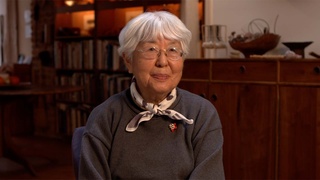Interviews
Jobs in Manzanar
Since I wouldn’t go to work, they gave me a pick and shovel with by brother-in-law. I didn’t know he would be my future brother-in-law at the time. We were working together, we went out there and had to clear the land to build more barracks. We went out there and chopped sage brush and the like.
We didn’t do that very long, and then we got on another job assignment - unloading trucks that were coming in. What we were unloading was all paper wrapped. So finally one, I don’t know if somebody purposefully cut one open. Anyway, one fell out, cylinders like that. This is burlap, and it’s different colors. We couldn’t figure out what this is going to be used for.
Next thing we knew, they had built a camouflage factory outside the camp. All you had to do was go through the fence and walk to that wall right over there, and that’s where the camouflage factory was. It was a great big shape like the barrack but only higher. Because you had to put up these here camouflage netting, the fish net and all that. The girls would weave these different colors of burlap. That’s where I worked in there as more of a supplying the girls. We had to cut that in four or five feet strips.
Date: February 6, 2015
Location: California, US
Interviewer: John Esaki
Contributed by: Watase Media Arts Center, Japanese American National Museum
Explore More Videos

Evacuated to the Jungle
(b. 1938) Philipines-born hikiagesha who later migrated to the United States.

Captured by Guerillas after bombing of Pearl Harbor
(b. 1938) Philipines-born hikiagesha who later migrated to the United States.

Grandfather picked up by US Army
(b. 1952) Former banking executive, born in Hawaii

Father's business partner operated their farming business during WWII
(b. 1935) Sansei businessman.

Father was convinced the constitution would protect him
(b. 1935) Sansei businessman.

The lack of discussion about family’s incarceration in Amache
Sansei judge for the Superior Court of Los Angeles County in California


Passing Time in the Camps with Baton Twirling
(b. 1932) Nisei American stage, film, and TV actress

Grateful for The Quakers’ help in camp and finding jobs outside of camp
(b. 1923) Japanese American poet, activist

Her brother’s reasons as a No-No Boy
(b. 1923) Japanese American poet, activist

Her grandfather was pressured to teach Japanese
Sansei judge on the Superior Court of Los Angeles County in California

Neighbor took care of her mother after grandfather was taken by FBI
Sansei judge on the Superior Court of Los Angeles County in California

Immediately after the bombing
(b. 1938) Japanese American. Hiroshima atomic bomb survivor

Other family members not as lucky
(b. 1938) Japanese American. Hiroshima atomic bomb survivor

His parents had little hope that he had survived the atomic bomb
(b. 1938) Japanese American. Hiroshima atomic bomb survivor
